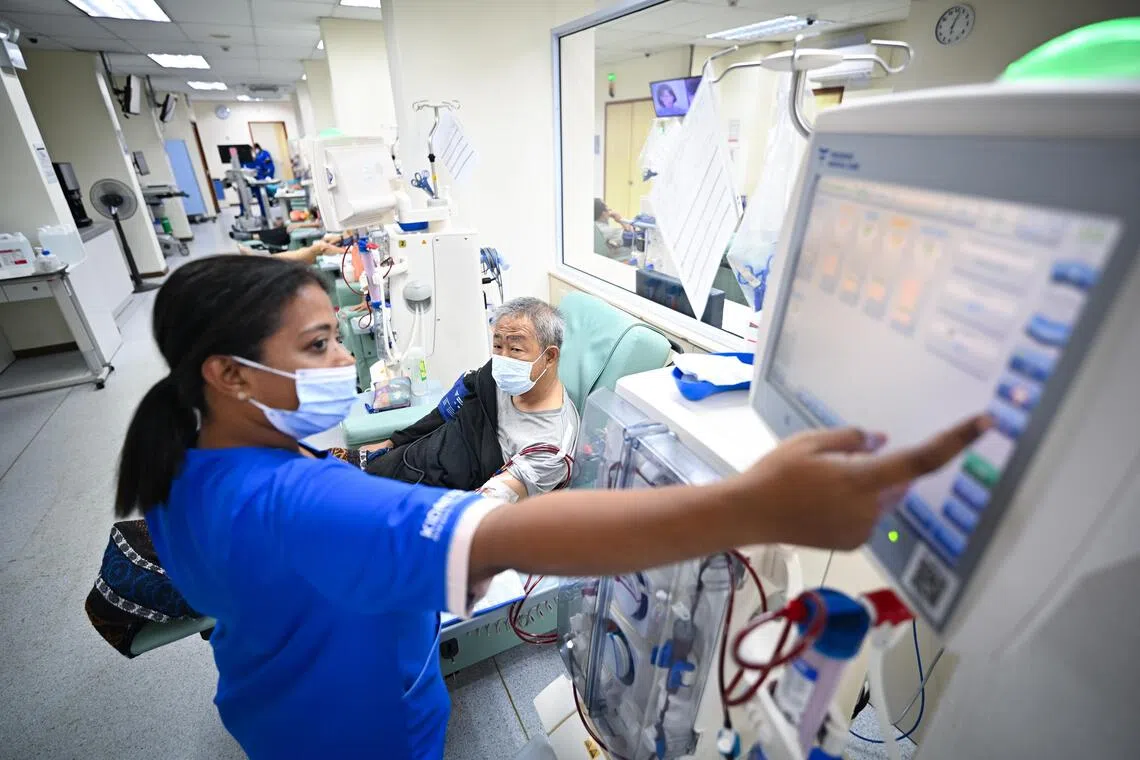Kidney transplantation now includes a new pathway: Donations after the heart stops
Sign up now: Get ST's newsletters delivered to your inbox

While such donations are relatively new in Singapore, they have been increasing in countries like Britain and the US.
ST PHOTO: LIM YAOHUI
- Singapore expanded kidney donations to include donors after circulatory death (DCD) nationwide in 2024, following a successful pilot programme.
- Since 2020, 12 patients received kidneys from DCD donors; this option arises when aggressive treatment is futile and families choose comfort care.
- MOH and NOTU promote organ donation via public awareness, like the Live On Festival, because less than 10% on the waiting list for a kidney received a transplant.
AI generated
SINGAPORE – From 2020 to 2024, a total of 12 patients received kidney donations from donors who died of cardiac arrest, in a practice that has now been implemented nationwide, said the Ministry of Health (MOH).
These are also known as donations after circulatory death (DCDs) and are unlike conventional donations after brain death, in which organ donation occurs in patients declared brain-dead.
DCD occurs after the heart has stopped beating irreversibly and circulation and oxygenation to the tissues stop irreversibly. This is known as circulatory death.
Singapore’s first kidney DCD was carried out in 2016, said MOH.
“Following a pilot programme, kidney DCD was subsequently extended nationwide in 2024,” a spokesman said.
While DCD is relatively new in Singapore, such donations have been increasing in countries like Britain and the US.
In Asia, South Korea – whose organ donation system depends almost entirely on brain-dead donors – announced on Oct 16 its first-ever national plan to allow organ donations after a patient’s heart stops
Other organs such as the liver, lungs, pancreas and heart can also be recovered for transplant after circulatory death is certified, but these have not been carried out in Singapore.
DCD in Singapore was previously limited to donation of tissues such as corneas, skin, heart valves and iliac vessels (blood vessels that provide blood to the lower part of the body, including the pelvis, reproductive organs and legs), MOH said.
It said the possibility of kidney DCD will be considered only after the doctor has assessed that further aggressive treatment for the patient is futile and the patient’s next of kin has decided on comfort care and to withdraw aggressive treatment, including ventilatory support in the intensive care unit.
The kidney DCD also allows the next of kin to fulfil the deceased person’s wishes of donating kidneys for transplant when donation after brain death is not feasible, MOH said.
Singapore’s Human Organ Transplant Act is a mandatory organ donation scheme for all citizens and permanent residents aged 21 and above, unless they have opted out.
In Singapore, as at June 2025, close to 580 patients were on the waiting list for an organ transplant, 412 of whom were waiting for a kidney.
There were 46 deceased donor kidney transplants and 57 living donor kidney transplants in 2024. In the first six months of 2025, those numbers were 12 and 24, respectively.
In the last five years, fewer than 10 per cent of patients on the kidney transplant waiting list received a transplant from a deceased donor, with an average waiting time of about nine years for a deceased donor kidney transplant, MOH said.
“While more patients have benefited from organ transplants through these initiatives, there is still room to improve the organ transplant rates in Singapore,” said its spokesman.
He added that MOH and the National Organ Transplant Unit (Notu) will continue to encourage Singaporeans to support organ donation, such as by holding public education activities to shift societal attitudes and views on organ donation.
An ongoing initiative by Notu is the annual Live On Festival, which encourages participants – young people in particular – to express their thoughts on organ donation and transplantation through a design and essay competition.
When it comes to the donations of hearts after circulatory deaths, special protocols and technology are used to assess and resuscitate the heart before transplant, said Ms Kerk Ka Lee, senior clinical transplant manager at the Heart and Lung Transplant Unit of National Heart Centre Singapore.
“However, when cardiac arrest occurs suddenly and unexpectedly in the hospital, the uncontrolled nature of the event means the heart cannot be preserved in time for transplantation,” she said.
Ms Kerk added that some centres overseas are exploring techniques to resuscitate and assess hearts from controlled DCD donors. This is when organ retrieval takes place after the planned withdrawal of life-sustaining treatments that have no overall benefit to a critically ill patient in intensive care or the emergency department.
“But this is highly specialised and is not the same as using a heart from someone who died unexpectedly of cardiac arrest,” she said.



